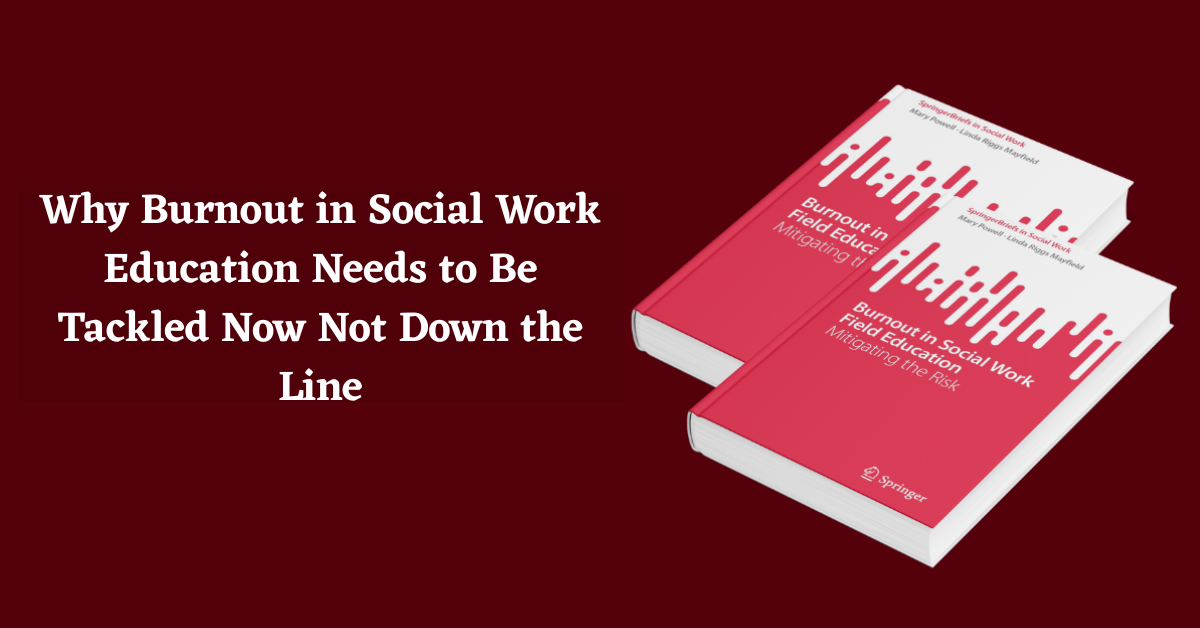For social workers, burnout is usually considered to be an occupational risk associated with years of intense client work. But what if burnout begins earlier way earlier before even a student graduates? In Burnout in Social Work Field Education: Mitigating the Risk, Dr. Mary Powell argues persuasively that initial symptoms of burnout tend to emerge during field placements, when social work students are getting their first true taste of working in professional environments. And far too frequently, those early warning signs are not recognized.
Dr. Powell, a licensed clinical social worker, psychoanalyst, and educator at Fordham University, never had any ambitions to become an author. Her book was the result of lived experience and an intense desire to make the profession better from the ground up. Through working with outpatient clinics and supervising MSW interns, she saw a disconcerting trend: students were exhibiting signs of burnout many years before they had ever even entered the workforce. This observation launched a professional and scholarly odyssey on her path that brought her to study burnout in MSW field placements research that ended up being her doctoral dissertation and, eventually, this book.
So what is burnout, then? Operational in psychological literature as a condition of emotional exhaustion, depersonalization, and reduced feelings of personal accomplishment, burnout has historically been researched among practicing professionals. However, Dr. Powell turns the focus, examining instead students in their field internship something that until now has been woefully under-studied.
Her discoveries are telling. Perhaps the leading cause of burnout in students is role ambiguity. Unlike workers, students enter organizations with poorly defined roles. They’re asked to “learn by doing,” but what precisely they should do and how they’ll be guided is often ambiguous. This ambiguity can leave students in a state of confusion and disorientation, speeding up emotional exhaustion and eroding self-confidence.
Add to that the stress of doing well, the emotional strain of working with at-risk clients, and the fact that so many students are juggling work and family responsibilities with school, and you have a recipe for disaster.
Dr. Powell’s book is more than diagnosis it gives you a way out. The most fascinating bit of information from her study is about coping strategies. Traditional wisdom has long taught that problem-focused coping (direct action to solve problems) is preferable to emotion-focused coping (managing feelings about problems). But in her research with 203 MSW students, she discovered the opposite: students who relied on emotion-focused coping were less likely to experience burnout. In social work education, where students rarely possess the experience or power to directly alter their situations, emotion-focused methods such as mindfulness, reflection, and social support might be more adaptive.
These results reinforce one of the book’s core arguments: in order to safeguard their students, institutions must do more than promote individual self-care. They must offer structure, mentoring, and clear expectations. Prevention of burnout cannot fall solely on the student it’s everyone’s responsibility, including schools, supervisors, and agencies.
The book is being written not only for students, but for all those engaged in preparing the next generation of social workers: professors, field instructors, agency directors, and curriculum developers. It’s an appeal to acknowledge that burnout prevention starts in education, not following the achievement of a degree.
Dr. Powell’s research is particularly timely in the post-COVID world. The pandemic redesigned the way field placements are carried out, with an overlay of uncertainty and isolation that can heighten stress. Her work reflects these changes and provides solutions that are as practical as they are timely.
Ultimately, Burnout in Social Work Field Education is at once a professional guide and personal reflection. On every page, Dr. Powell’s enthusiasm for the profession and her students is palpable. Her message is unequivocal: if we hope to have resilient, ethical, and emotionally healthy social workers in our communities, we must begin investing in them well before graduation.
For students, this volume provides affirmation and real-world application. For educators and for schools, it offers a blueprint for institutional change. And for the profession as a whole, it’s a reminder that compassion starts not just with clients but with those we prepare to work with them.









